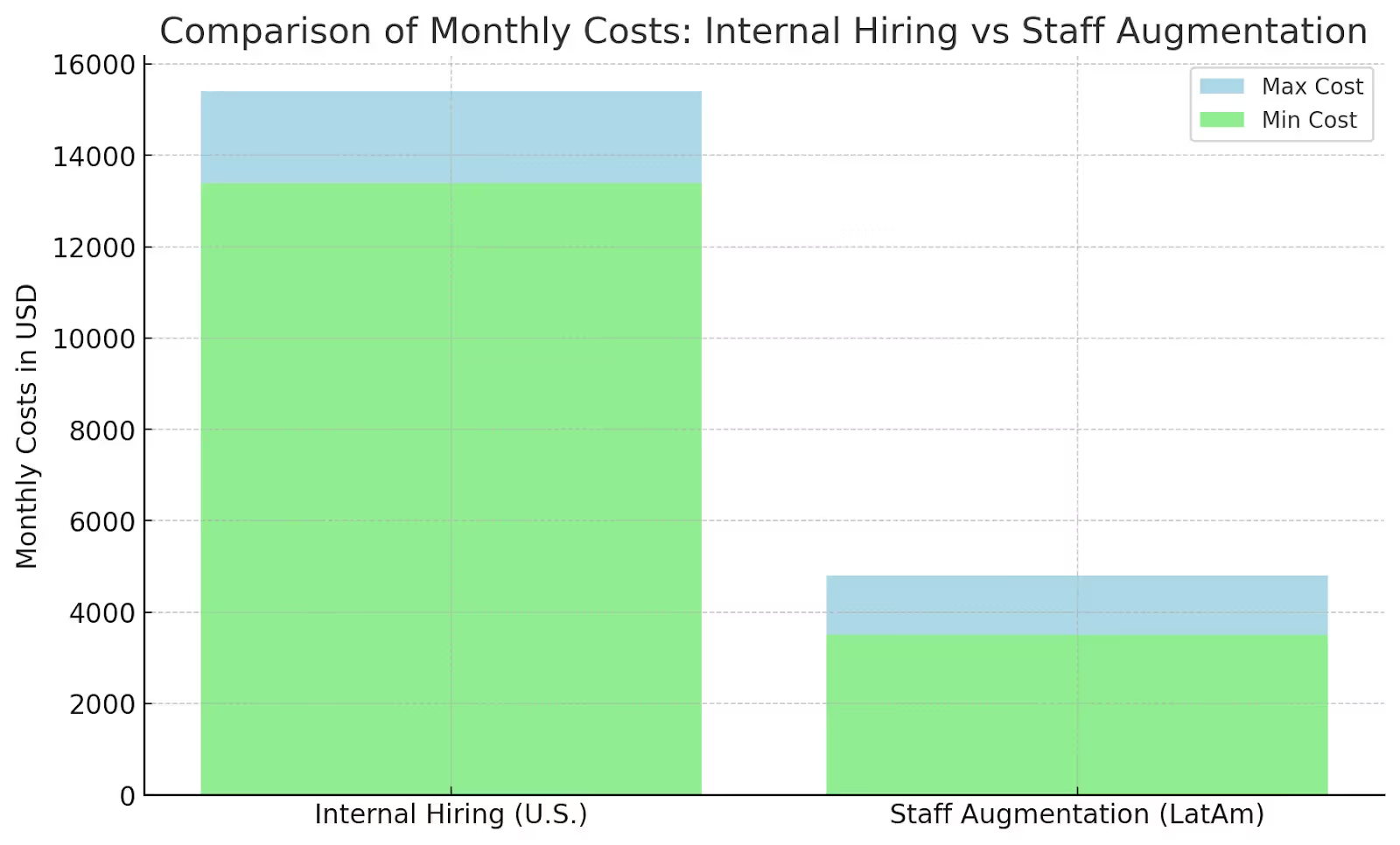Staff augmentation services have emerged as a strategic solution for companies seeking to scale their workforce with precision and agility. More than just a temporary fix, staff augmentation has become critical for organizations looking to stay competitive in today's fast-paced business environment. This approach allows organizations to bring in external talent to fill specific skill gaps, enabling teams to be more agile, specialized, and capable of tackling complex challenges.
Unlike traditional hiring or outsourcing, staff augmentation allows organizations to retain complete control of projects while benefiting from external expertise. Whether it's addressing short-term projects or scaling long-term initiatives, this strategy provides the talent needed to meet current demands without the complexities of a full-time hire.
Why Companies Choose Staff Augmentation Services
Organizations turn to staff augmentation services for a number of reasons, with flexibility, cost-effectiveness, and access to specialized skills at the forefront. As businesses face rapid changes in technology and market dynamics, having a workforce that can adapt and evolve is critical. By using staff augmentation, organizations can respond quickly to new opportunities or challenges without being tied down by the lengthy process of traditional hiring.
In addition, the ability to scale teams up or down based on project requirements allows for greater financial control. Rather than maintaining a large in-house staff, organizations can bring in experts only when needed, optimizing resources while reducing overheads.
In a report by The Boss Magazine, companies undergoing digital transformation, for instance, have increasingly turned to IT staff augmentation to navigate complex tech implementations, ensuring they remain competitive in the ever-changing digital landscape.
Types of Staff Augmentation Services
Staff augmentation services come in various forms, each tailored to the unique needs of businesses. Broadly, these services fall into the following categories:
- Short-term augmentation: Ideal for businesses that need a temporary boost in talent for a specific project or during peak business periods.
- Long-term augmentation: For ongoing projects requiring extended support, long-term staff augmentation ensures that businesses have consistent access to external expertise without committing to permanent hires.
- Skill-based augmentation: This type focuses on filling highly specialized roles where in-house talent may be lacking, such as IT, software development, or other niche fields.
By understanding these types, companies can better determine which approach aligns with their goals and needs.
Benefits of Staff Augmentation Services for Businesses
One of the primary benefits of staff augmentation services is the ability to tap into a global talent pool. This flexibility allows businesses to source the best talent, irrespective of geographical constraints. Moreover, staff augmentation offers enhanced control over project outcomes since augmented staff typically work directly under the company’s management, ensuring alignment with internal processes and goals.
Additional benefits include:
- Cost Savings: Avoiding the costs associated with full-time employees, such as benefits and training.
- Agility: Quickly adjusting the workforce size and expertise based on project needs.
- Risk Mitigation: Reducing the risks associated with overstaffing during lean periods or underperforming in key areas due to understaffing.
As noted by BizTech Magazine, IT staff augmentation allows companies navigating rapid digital transformation to remain agile, reduce operational delays, and keep up with technological advancements.

Key Differences Between Staff Augmentation and Consulting
While staff augmentation and consulting may seem similar, they serve distinct purposes. Staff augmentation provides additional resources that work under the company’s direct supervision to complete specific tasks or projects. These professionals integrate with existing teams and follow the company's workflow and processes.
Consulting, on the other hand, typically involves an external team that provides strategic advice, identifies solutions, and often oversees the execution of projects. Consultants usually operate independently of the internal team, offering expertise but not becoming embedded in day-to-day operations.
Understanding this distinction is essential for companies looking to determine whether they need extra hands on deck (staff augmentation) or external strategic direction (consulting).
How Staff Augmentation is Changing Workforce Strategies
The modern workforce is evolving, and so are the strategies companies use to manage it. Staff augmentation services are now an integral part of workforce planning, enabling companies to quickly adapt to new challenges without compromising quality or productivity.
One of the most significant changes is the shift to a hybrid workforce model, where internal teams work alongside external specialists. This ensures that organizations remain agile and enables continuous innovation by tapping into diverse skill sets and perspectives.
When Should Companies Use Staff Augmentation Services?
Deciding when to use staff augmentation services depends on several factors, such as the complexity of the project, the availability of internal resources, and budget constraints. Generally, businesses should consider staff augmentation when:
- They need specialized skills that are not available in-house.
- They want to scale their team quickly for mid-term projects.
- They aim to reduce the costs of long-term hiring processes.
Staff augmentation is also an excellent choice for companies looking to explore new technologies without committing to a permanent workforce. For example, businesses diving into artificial intelligence, machine learning, or cloud computing often utilize staff augmentation to bring in expertise without long-term financial commitments.
How Staff Augmentation Services Fit into Agile Teams
Agile teams thrive on flexibility and rapid iterations, making staff augmentation a perfect fit. External talent can seamlessly integrate into agile workflows, contributing to sprints and helping deliver results faster. This adaptability allows teams to remain lean while still accessing the expertise needed to tackle specific challenges or to speed up development cycles.
Companies practicing agile methodologies benefit from the ability to onboard highly skilled workers for individual tasks or projects without disrupting the established team dynamics.
Looking to enhance your agile team? Consider reading our blog on the Nearshore Staff Augmentation: Scale Your Team with Agility
Cost Efficiency and Flexibility in Staff Augmentation Services
One of the main reasons companies choose staff augmentation is the financial benefits of hiring full-time remote workers in Latin America. This model provides access to highly skilled talent at a lower cost by eliminating additional expenses such as benefits or complex onboarding processes. It also provides the flexibility to scale teams according to the needs of the project.
Teilur Talent specializes in providing full-time talent from Latin America, with fully transparent pricing and a selection process focused on the specific needs of each company. In addition to meeting technical requirements, Teilur Talent ensures that the talent fits the company's time zone, culture and values, ensuring a smooth and long term integration.
Looking to understand how much you could save? Check out how Teilur Talent's pricing disrupting with transparency in recruiting.
Industries that Benefit the Most from Staff Augmentation
While staff augmentation can be applied to virtually any industry, it is especially beneficial in sectors that require specialized skills and rapid scalability. The technology sector, particularly in IT and software development, is one of the top beneficiaries. Healthcare, manufacturing, and financial services are also key industries where the demand for specialized, flexible labor is high.
For example, as highlighted by The Boss Magazine, businesses undergoing digital transformation, such as those implementing new IT systems, are leveraging staff augmentation to bring in experts that can handle the technical demands without the need for long-term commitments.
Teilur Talent has a deep understanding of these industries, offering tailored solutions that meet the dynamic needs of each sector.
FAQ
What is staff augmentation vs. consulting?
Staff augmentation involves adding temporary workers to your team to assist with specific tasks, while consulting provides strategic advice and oversight for projects, usually working independently from the team.
What is the meaning of augmentation in work?
Augmentation in work refers to the process of enhancing or supplementing a company’s workforce by adding external professionals to fill skill gaps or meet project demands.
What does augmented staff mean?
Augmented staff are external professionals temporarily integrated into a company's team to work on specific tasks or projects, offering specialized skills without permanent employment.
What is the offer of staff augmentation?
Staff augmentation offers businesses access to a flexible workforce that can be scaled up or down based on project needs, providing specialized skills without the overhead of full-time employment.
Conclusion
Staff augmentation services offer businesses the flexibility, control, and expertise needed to thrive in a competitive and constantly evolving landscape. As a strategic approach, it allows companies to adapt to new challenges while optimizing their resources quickly.
To help you make the best decision, use the calculator below to estimate your costs and potential savings. For more details and personalized advice, please contact us.







